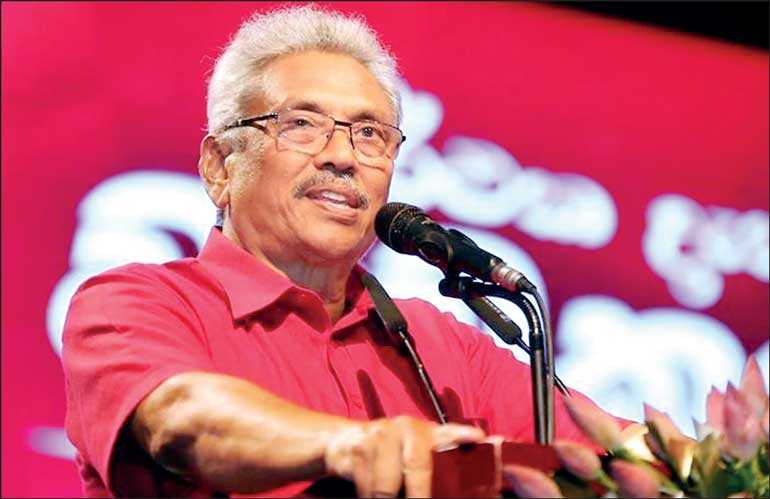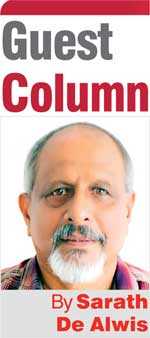Tuesday Feb 17, 2026
Tuesday Feb 17, 2026
Friday, 20 March 2020 00:00 - - {{hitsCtrl.values.hits}}

“...since the order of the world is shaped by death, mightn’t it be better for God if we refuse to believe in Him and struggle with all our might against death, without raising our eyes towards the heaven where He sits in silence?”
- Albert Camus
On Tuesday night, President Gotabaya Rajapaksa addressed the nation. He outlined measures taken to combat and contain the COVID-19 virus.
He entreated all Sri Lankans to cooperate with the Government in the superintendence and mitigation of the threat.
People should avoid gatherings to prevent the spread of the virus. Decisions of the Government must address multiple issues. Parts of the country faced a drought and drinking water had to be provided. Agricultural produce should reach the market while producers received a reasonable reward. Prices of essential foods should be affordable. Government services had to be uninterrupted and efficient.
After securing his presidential mandate, he was compelled to function with a minority government. The predecessor Government had not presented a budget. He had to rely on a ‘Vote on Account’.
Hence there was no money to pay for fertiliser, medicine and numerous other necessities.
To make good on the promises he made, he needed a government with a stable majority. “Therefore, I dissolved Parliament at the first opportunity calling for fresh elections. I implore you to endorse the leadership of Prime Minister Mahinda Rajapaksa, arguably the most endearingly acceptable leader, and provide me with a stable government for me to deliver on my mandate.”
The President concluded with the reassuring declaration, “Today this country which is yours and mine is safe.”
I listened to the President on YouTube late Tuesday night. To be honest I expected a nuanced articulation of methods and measures to restore public confidence in our ability to meet the crisis. I was disappointed. I am appalled.
Although I did not vote for him, I was glad that Gotabaya Rajapaksa was our president when coronavirus hit our shores.
The prompt deployment of defence personnel to handle logistics and enforcement of quarantine imperatives was reassuring. The steady directives from medical professionals demonstrated that science had taken precedence over tribal chants and voodoo cures.
In this eerie locked-up mode, my mind roamed all over while I waited to hear our ‘strongman’ President. All though I have written plenty opposing his politics and his quest for the presidency I was happy that he was the president in this hour of the pandemic peril.
What would have happened if this had happened in early 2019 instead of late 2019 and early 2020? The very thought is mindboggling.
The 19th Amendment would have become an indefensible constitutional aberration. Prime Minister Wickremesinghe would have appointed a committee of UNP lawyers to probe the virus. President Sirisena would have outsmarted him by appointing a Presidential Commission.
The Prime Minister would have appeared before the commission and insisted that before dealing with the coronavirus we should investigate the bubonic plague.
Virus clusters would have found refuge in seafront penthouses. Virologists would be debating whether candidates for clinical trials of the vaccine should be through public auction or private placement.
The bloody pandemic would have turned into a perpetual fiasco and only a forensic audit would have unearthed the cabriole microbes.
No thank you. No thank you. For the time being, I was content with the soldier President who won a majority of the majority in saddle. After all, the nation was gripped in existential despair. Inanities such as inclusivity and right to dissent could wait for another day.
Then I listened to the President.
When I heard about dhal and canned fish as soothers to fight the pandemic I was truly boxed in bewilderment. I did not know whether to laugh or cry.
Then I heard the appeal for a stable parliamentary majority under the unequivocally-adored Mahinda Rajapaksa, I made up my mind. I cried.
Events on this kind of world scale don’t come every day. When such calamities are met with ‘parippu and tin maalu,’ what else can one do but to cry?
Today the people are watching in silence. Sooner than later the virus will hit the shantytowns in the Indian subcontinent. It is then that we will realise that we were watching two trains hurtling towards each other on a single track.
The argumentative South Asians are not tamed by a 5,000-year-old civilisation that regards conformity the all-embracing virtue of their society. The sub-continent will not respond with the versatility of the Chinese. The scoundrels of Sri Lankan origin who evaded quarantine formalities on arrival are the argumentative type. Eventually a vaccine will be developed. But not before the virus invades the shantytowns in the adjoining sub-continent.
The coronavirus does not discriminate between patriots and traitors. It doesn’t spare fools and infect only crooks. It will not find Dravidians more enticing than descendants of Ravana or ‘Helas’ carrying Indo-Aryan gnomes.
All citizens must sidestep and leave behind ideological, cultural, spiritual and tribal distinctions.
Hoteliers are worried about empty rooms and cashflows. There is a demand for rescheduling or moratoriums on repaying bank loans. Whose problems, are they?
It was public cash in the banks that sustained the stock market. Now the stock market is shut. Why? Because stock market valuations belong in the moon and has no relationship to our productive capacity on earth. It was ‘api’ who kept ‘thopi’ on the merry go round. We build hotels with funds from our pension funds. We subsidise the National Carrier to bring holidaymakers on lower than cost prices to fill those hotels.
What the virus crisis has exposed is a universal truth applicable to all lands and people who adopted market economics that became fashionable in the ’80s.
It resulted in a universal trend. It systematically implemented upward redistribution of social wealth to a privileged financial oligarchy.
The coronavirus must be contained. We must not underestimate the enormity of the threat or the magnitude of the task of resolving it.
The battle to contain the viral menace should not be made a manipulative tool to trivialise ongoing judicial inquiries into rip-offs in buying aircraft, swindling of sovereign bonds and dark money trails of dubious diplomats.